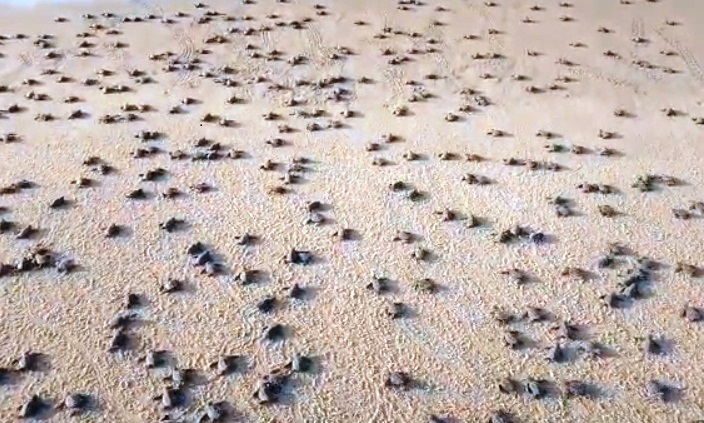Kendrapara: Marine scientists across the globe have been carrying out research on life cycle of endangered Olive Ridley turtles. It is said that only one in a thousand turtles survives.
As their mortality rate is high, International Union for Conservation of Nature (IUCN) has placed the marine species in the red list. Environmentalists have underscored the need for protection of the nesting site of the marine turtles at Gahirmatha sanctuary in Kendrapara district.
They have emphasised use of drones to keep vigilance on the nesting sites, spots of coastal erosion, the number of casualties and circumstances leading to the deaths of baby and adult turtles.
Use of drone on these aspects can help resolve various issues affecting the turtles, they observed. Secretary of Gahirmatha Samudrika Kainchha O Hentalbana Surakha Samiti Hemanta Kumar Rout, environmentalists Pradip Tarai, Milan Kumar, Khitish Kumar Singh and Bhubanmohan Jena said there are 360 species of turtles in the world.
“Among them, Olive Ridleys are fewer than the other species. Gahirmatha is known for their nesting place. The marine turtles lay eggs on an area spreading 27 square/km here. About 5 lakh turtles come to this nesting site every year. However, scores of them end up being killed for various factors. There has been no research on the life, survival strategies and migration of the endangered species,” they said.
Significantly, from this year, the forest department of Goa has deployed drones along its coast to keep a watch on safety of turtles, their movement and estimate their number. They, however, expressed concern that due to coastal erosion, the egg laying of the turltes has been affected at the site.
“No research on their life and activities isbeing conducted with the use of technology. As a result, the exact number of turtles thronging our coast, the number of casualties and their causes are not being ascertained,” they noted.
They pointed out the Goa forest department recently organised a workshop on effective use of drones made by University of Duke and another foreign university for safety of marine turtles. The Goa forest department and World Wide Fund for Nature (WWF) have used drones along the coast.
Drone cameras will keep a watch on coast erosion, its impact on turtle nesting sites and get an insight into activities of the turtles. DFO Jajnadatt Pati said restrictions were imposed along the coast from November 1 for safe nesting of turtles.
Security has been tightened. “But we have no plan to use drones for turtles this year, In coming years, such system may be considered for use,” he said.
PNN
